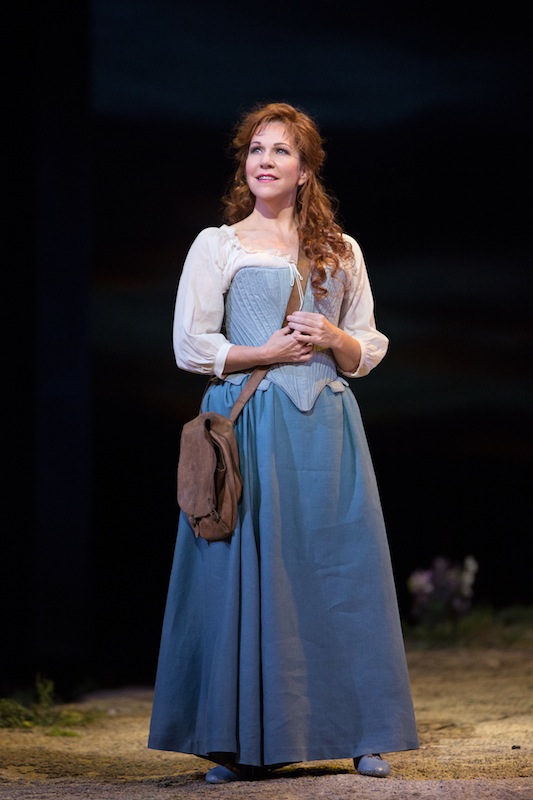Star trio makes Met’s “La Donna del Lago” a memorable evening

Joyce DiDonato stars as Elena in Rossini’s “La Donna del Lago” at the Metropolitan Opera. Photo: Marty Sohl
It’s easy to take the operatic canon for granted; the repertory at the Metropolitan Opera feels so fixed that a time when Aida, Bohème, and Carmen weren’t dominant mainstays of the house is hard to imagine.
Though a major success in its time, it took nearly 200 years for Rossini’s La Donna del Lago to arrive at the Met. Based on Sir Walter Scott’s widely admired poem The Lady of the Lake, Rossini’s Scottish romance might lack the effortless charm of Il Barbiere, but it is not short in musical inspiration. Full to bursting with vocal fireworks and gifted with an imaginative and lyrical score, La Donna, back for a second run at the Met, is a worthy addition to the company rep, one that will hopefully hang around for years to come.
The inaugural production is another matter. Debuted back in February of this year, Paul Curran’s staging is embarrassingly bare, though not for the sake of any high-minded minimalist concept–he has simply chosen to set most of the action on the least interesting hilltop in all the Highlands. Its chief virtue–admittedly not a small one–is that it is flattering to the singers, giving them little to do but stand on the apron, sword held high, and belt. For all its failings, this production can still be enlivened by a truly superb cast, and on Friday a trio of incandescent performances made this evening–in purely musical terms–one of the highlights of the season.
Returning to the role of Elena, the Highland maiden of the title, Joyce DiDonato is an absolute marvel. She came on strong from the very beginning, her voice in her entrance aria, “O mattutini albori,” unrolling like a bolt of silk. to hear her now is to hear a great voice in its prime: an easy, honeyed tone, ample volume, accurate pitch, a quick coloratura. Everything simply works for her, and on the foundation of that security she builds a sublime musical interpretation.
DiDonato’s most memorable moment is “Tanti affetti” right before the final curtain–she builds stunning arches in the aria, the lines achingly crafted with breathtaking beauty. The following cabaletta, a bubbling effusion of joy, sparkles like a diamond. DiDonato’s portrayal at this point is a complete vocal and dramatic achievement, and truly must be experienced in person to be appreciated.
Showing what can be accomplished when the company marshals all of its resources, the Met fields two tenors in this production who are the mezzo-soprano’s vocal equals, or close to it, each tossing off high Ds and machine-gun coloratura of their own. John Osborn, also returning from last season’s run, is even more secure this time around as the rebel leader Rodrigo. His timbre is remarkably dark for a leggiero tenor, lending him a rugged quality compared to the rest of the romantic leads. Hearing his smooth, lyric voice, it’s almost hard to imagine how he’ll climb up to the role’s top, but his instrument lightens quickly as it ascends. His singing was colorful and flowing in his entrance scene, which showed off not just a beaming final high C, but even one that he managed to float pianissimo in the aria “Ma dov’è colei.”
Lawrence Brownlee needs little introduction, owner of one of the most golden tenor voices currently performing. He is one of the few active tenors who can reliably reach the Puritani high F, and even the highest reaches of the role of Giacomo (King James V) seemed well within his zone of comfort. Low notes at times are a little growled, sitting at the very bottom of his true range, but there is an attractive peppery quality to his tone, not to mention an incredible thrill at the top. What’s more, Brownlee has the artistic sense to channel his vocal ability into sensitive performance; even among the volley of fireworks of “O fiamma soave,” showing himself far more nimble than the woodwinds that accompanied him, there was a tugging sadness around the edges of his phrases.
The supporting roles were less impressive. Daniela Barcellona, though no longer afflicted with a penciled-on mustache, wobbles severely as Malcolm. Oren Gradus, a gravelly Duglas, spends much of his energy lusting after a bottle of Macallan.
Conductor Michele Mariotti seems to have become even more comfortable with the score since February, leading to the finest work he has done in his young Met career. After a little raggedness in the opening bars of the first act, he quickly settled into a crisp, polished performance. Mariotti has a strong affinity for the bel canto style, bringing out the lush colors of the Met orchestra while maintaining a constant buoyancy in the sound.
The Met chorus, darting in and out through an array of costume changes, have rarely sounded more robust. This may not be the most inspired of the company’s stagings, and there is a good deal of awkward stage business, but Friday was an example of the truly superior quality of musical performance that the Met can assemble. Bel canto enthusiasts would be unwise to miss it.
La Donna del Lago runs through December 26 at the Metropolitan Opera. metopera.org


